The forum was organised under the auspices of the WAAPP with funding from the Spanish government and the European Union through the World Bank.
The validation of the CARG-Gambia draft manual document seeks to provide opportunity for the participants to look into the document critically and give constructive criticism and make adjustment and recommendations where necessary.
In his welcome remarks, the country project coordinator of WAAPP, Sheikh Tijan Sosseh, told the participants that the competitive research grant is a scheme being supported by WAAPP to enhance sustainable funding for research activities.
The function was held to validate the operation manual of the Competitive Agricultural Research Grant Scheme of the WAAPP, he said.
The CARG has two windows which are the regional and the national windows, with the regional one overseen by CORAF, which is the regional research council mandated by ECOWAS to coordinate and monitor WAAPP.
Thirteen countries in West Africa, including The Gambia, are involved in the implementation of WAAPP, he said, adding that each of these countries’ governments is supposed to help its agricultural sector to search for sustainable mechanisms or means of funding for research activities.
In his official opening statement, NARI director general Dr Babou Ousman Jobe commended WAAPP, collaborators and partnering institutions, notably the World Bank and CORAF/WECARD, for the laudable initiative.
He added that the competitive research grant scheme has been designed to provide operational cost funding.
Dr Jobe also stated that the aim of CARG is to improve relevance, efficiency, effectiveness and quality of research thus creating greater ownership, partnership, subsidiary and transparency, as well as promoting cross-institutional or cross-national collaboration and involvement of plurality of research services providers.



